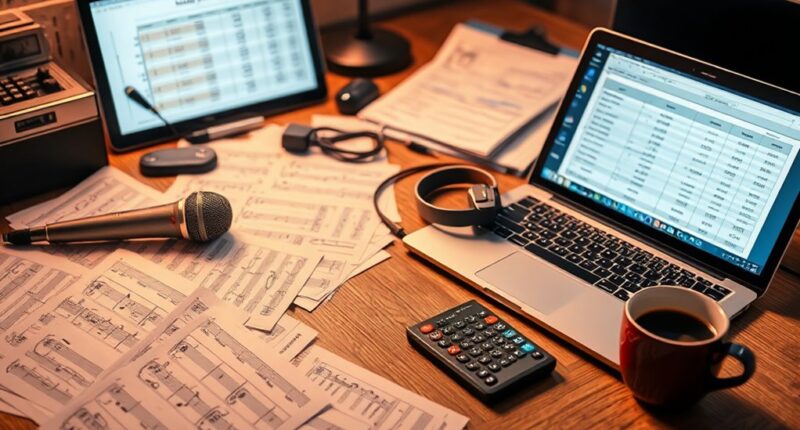As a musician, you can write off equipment, instruments, studio rent, travel expenses, marketing costs, and education related to your craft. However, personal items, hobbies, or costs not directly tied to your music career aren’t deductible. Keep detailed records of invoices and receipts, and separate personal from professional expenses to maximize deductions and stay compliant. Want to learn more about what qualifies and what doesn’t? Continue through to get all the essential details.
Key Takeaways
- Deduct equipment, instruments, and supplies used exclusively for your music business.
- Claim studio, rehearsal space, and home office expenses if used solely for work.
- Track travel, transportation, and lodging costs related to gigs and industry events.
- Deduct marketing, promotion, educational courses, workshops, and training that improve your skills.
- Personal expenses not directly related to your music career, like personal clothing and hobbies, are non-deductible.
Deductible Equipment and Instruments
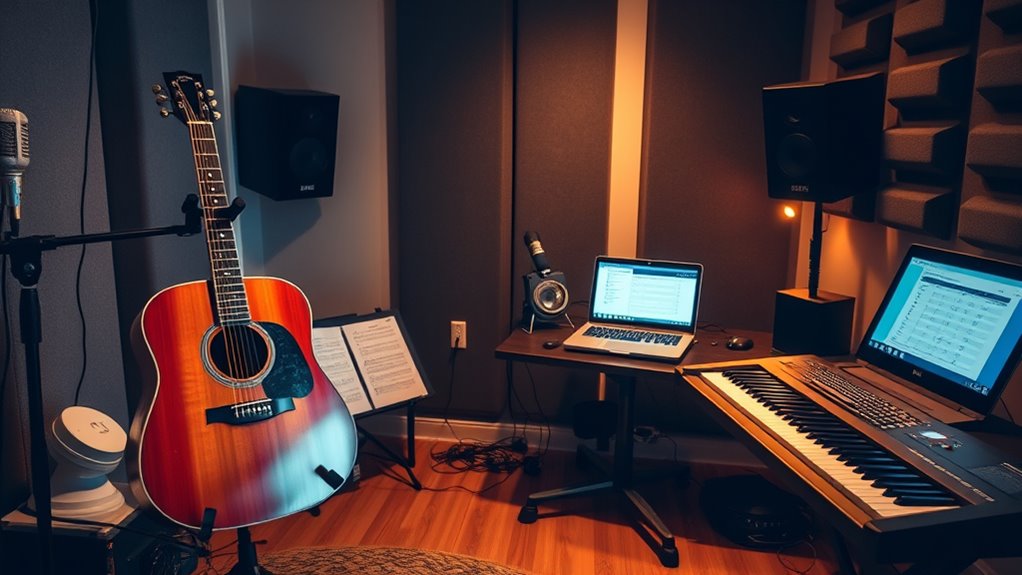
When you’re a musician or music teacher, the equipment and instruments you purchase for your work can often be deducted on your taxes. This includes guitars, keyboards, drums, microphones, and other essential tools you use regularly. If you buy a new instrument or upgrade existing gear, these costs can be written off as business expenses. Keep detailed receipts and records of your purchases to substantiate your claims. The IRS allows deductions for equipment that’s used primarily for your musical career, so personal use should be minimal. Remember, if you’re self-employed, you can deduct the full cost or depreciate more expensive items over several years. Staying organized and maintaining proper documentation ensures you maximize your deductions without any issues during tax season. Additionally, understanding how investment strategies can influence your online business presence might help you optimize your promotional strategies. Properly classifying your equipment as business expenses can also help you stay compliant with IRS regulations. Understanding the distinction between deductible equipment and personal items is essential for accurate tax reporting.
Studio and Rehearsal Space Expenses
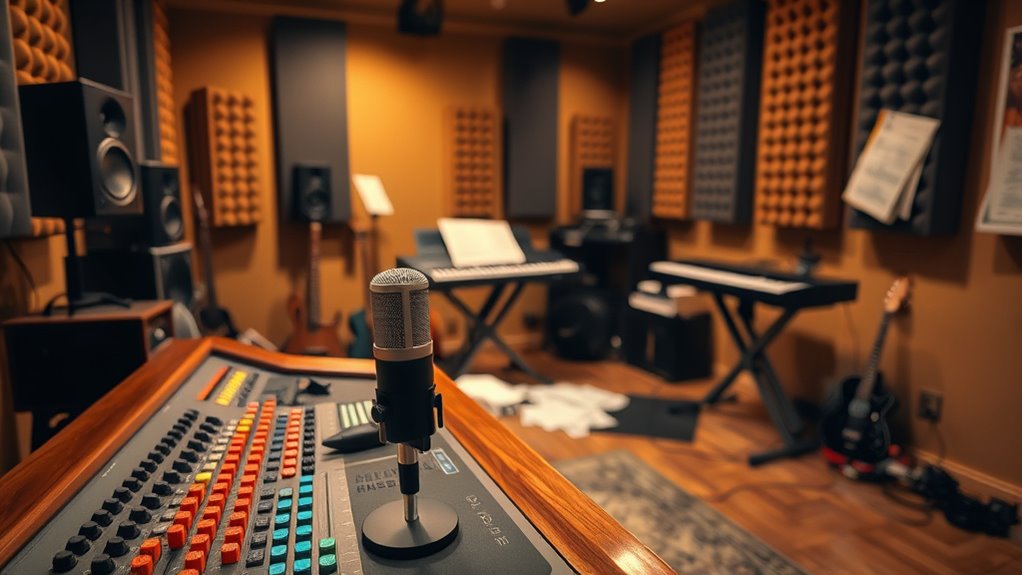
To qualify for deductions, you need to use your studio or rehearsal space exclusively for your music business. If you work from a home studio, you’ll want to understand how to meet the IRS criteria for home office deductions. Additionally, having a clear rental agreement can support your claim if you rent space or equipment for rehearsals.
Valid Business Space
If you use your studio or rehearsal space exclusively for your music business, you may be able to deduct expenses related to that space on your taxes. To qualify, the space must be used solely for business purposes, not personal use. This includes dedicated rooms or areas where you produce, practice, or record music. The space can be located at your home or a separate commercial location. Keep detailed records of your expenses, such as rent, utilities, repairs, and equipment costs directly related to the space. Remember, the IRS scrutinizes these deductions carefully, so ensure your use is exclusive and well-documented. Additionally, understanding the purpose of prophetic dreams can provide insight into subconscious influences that may affect your creative process. Properly naming and organizing your dog names can also help maintain a professional and consistent image for your music brand. If you meet these criteria, claiming your business space expenses can considerably reduce your taxable income.
Home Studio Deductions
Claiming home studio deductions can substantially lower your tax bill, provided you use a dedicated space exclusively for your music business. To qualify, the space must be used regularly and solely for creating, rehearsing, or managing your music activities. You can deduct a portion of your rent or mortgage, utilities, internet, and maintenance costs based on the percentage of your home that serves as your studio. Keep detailed records of expenses and determine the precise area used for your music work. Remember, only the part of your home used exclusively for your business is deductible—using the space for personal reasons disqualifies it. Proper documentation and a clear distinction between personal and business use are essential for maximizing your deductions without risking audit issues.
Rental Agreement Requirements
Having a proper rental agreement in place is essential for claiming deductions on your studio or rehearsal space expenses. Your lease or rental contract should clearly specify the terms, including the rental amount, payment schedule, and the duration of the agreement. It’s important that the agreement explicitly states that you are renting the space for business purposes, not personal use. Keep copies of the signed lease, as the IRS may require proof of your rental arrangement. The agreement should be in writing and detail the space’s location, size, and any included amenities. Having a documented, legitimate rental agreement ensures your deduction is defensible if audited and helps establish that the space is used primarily for your music business. Additionally, documenting the space’s use can support your claim that it functions as a dedicated home office or studio, which is often necessary for substantiating expenses. Furthermore, maintaining records of how often and for what purpose you use the space can strengthen your case during an audit, especially if the space’s use is part-time or shared.
Travel and Transportation Costs
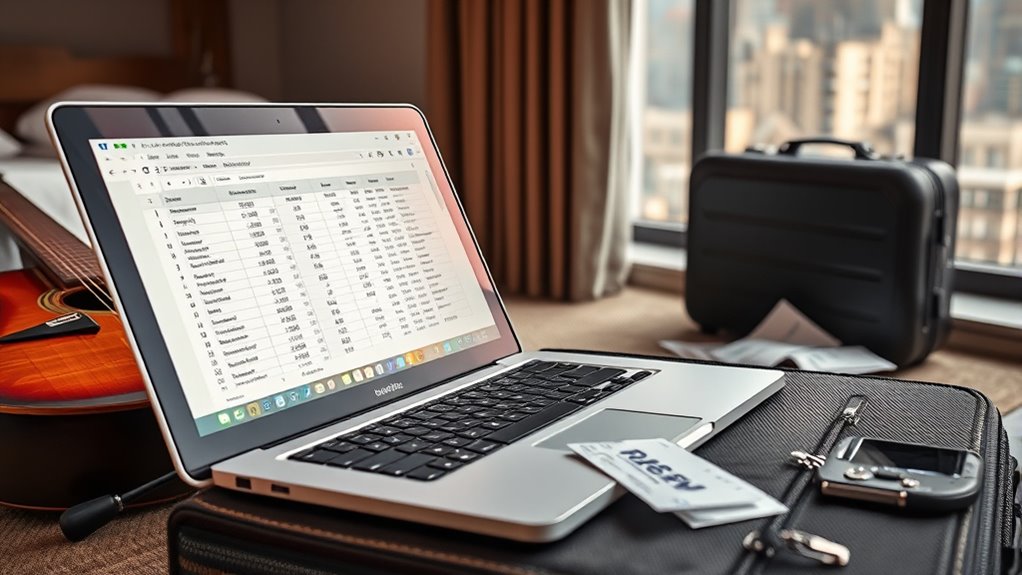
Ever wondered which travel expenses qualify for music tax deductions? If you tour frequently or attend industry events, certain costs are deductible. First, you can write off transportation expenses like flights or train tickets to gigs or conferences. Second, mileage for your car while traveling for work counts—you can deduct the miles driven to gigs or rehearsals. Third, lodging costs for overnight stays are eligible, including hotels or Airbnb rentals. Finally, you can deduct expenses for taxis, ride-shares, or rental cars used during your travels. Keep detailed records of your receipts and mileage logs. These costs directly relate to your music career and are essential for performing or promoting your work, making them legitimate deductions on your taxes. Additionally, understanding deductible travel expenses can help maximize your tax benefits and ensure compliance with IRS regulations.
Marketing and Promotion Expenses
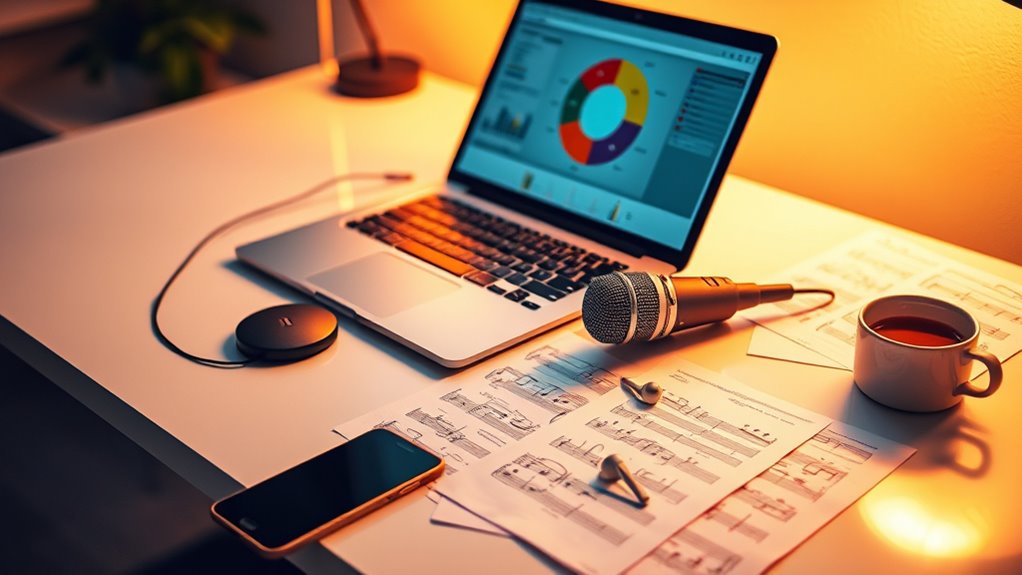
Are your marketing and promotion efforts essential to growing your music career? If so, you can deduct many related expenses on your taxes. This includes costs for advertising, such as social media ads, flyers, and posters. If you hire a publicist or promotional assistant, those fees are deductible too. Expenses for creating promotional materials, like website design or recording demo reels, qualify as well. Attending industry events, showcases, or networking functions to promote your music is also deductible. Keep detailed records of all receipts and invoices. Remember, these expenses must be directly related to promoting your music and not personal or unrelated business activities. Proper documentation ensures you maximize your deductions while staying compliant with IRS rules. Additionally, content relevance and authority can be enhanced by integrating targeted promotional strategies that resonate with your audience.
Education and Training Deductibles
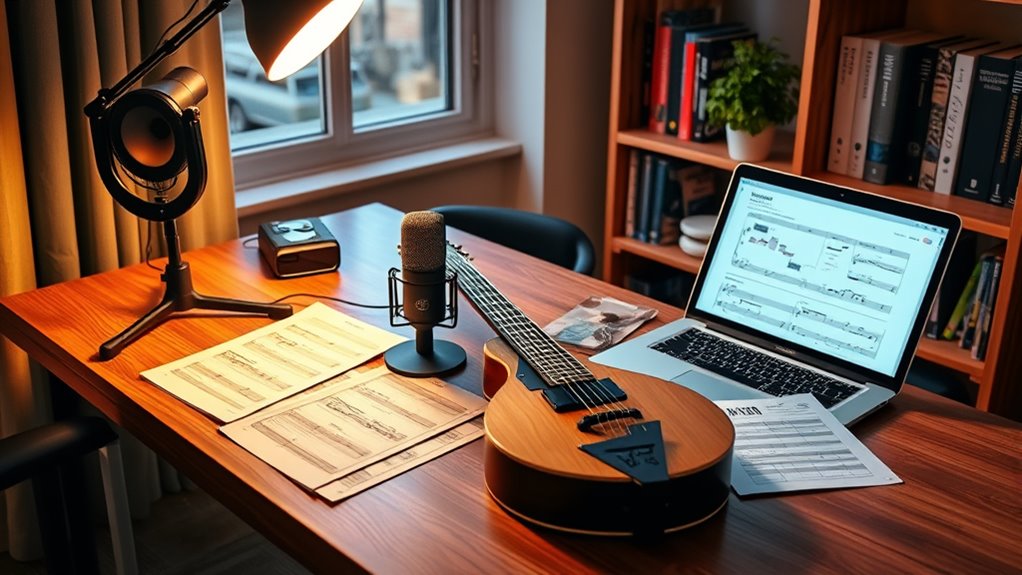
Investing in your skills can be a smart way to reduce your tax bill. You can often deduct course fees, tuition, and costs for workshops or seminars that improve your musical abilities. Let’s explore how to maximize these education and training deductions. Incorporating data-driven decision-making can help you identify the most beneficial courses and opportunities for growth. Staying informed about current trends, such as breakfast delivery options, can also help you make strategic choices in your professional development. Understanding grocery savings strategies may also assist you in budgeting for educational expenses more effectively. Additionally, being aware of the different paint sprayer types and their capabilities can help you choose the right tools for your projects, mirroring how selecting appropriate educational resources can enhance your skills more effectively.
Course Fees and Tuition
If you’re pursuing music courses or training to improve your skills, you might be able to deduct the related fees and tuition on your taxes. These expenses can include:
- The cost of enrolling in a music school or online program
- Tuition payments for private lessons with a music instructor
- Fees for specialized training, like vocal coaching or instrument mastery
- Expenses for certification or licensing courses needed for your career
Make certain the courses directly relate to maintaining or improving your current profession. Keep receipts and documentation to substantiate your claims. Remember, these deductions apply if the training helps you perform your current job or advance in your career as a musician. Verify IRS guidelines to ensure your expenses qualify.
Workshops and Seminars
Building on your efforts to enhance your musical skills through courses and tuition, attending workshops and seminars can also qualify as deductible education expenses. These events often provide hands-on instruction, networking opportunities, and industry insights that directly impact your career. To qualify, the workshops must relate to your current work or help maintain or improve your skills as a musician. Keep records of registration fees, receipts, and agendas to substantiate your deduction. Online seminars and local workshops are both eligible, as long as they meet IRS criteria. Remember, the key is that the primary purpose is to improve your professional skills. Don’t overlook these expenses—they can substantially reduce your taxable income when you attend relevant educational events.
Personal Items and Home Office Deductions
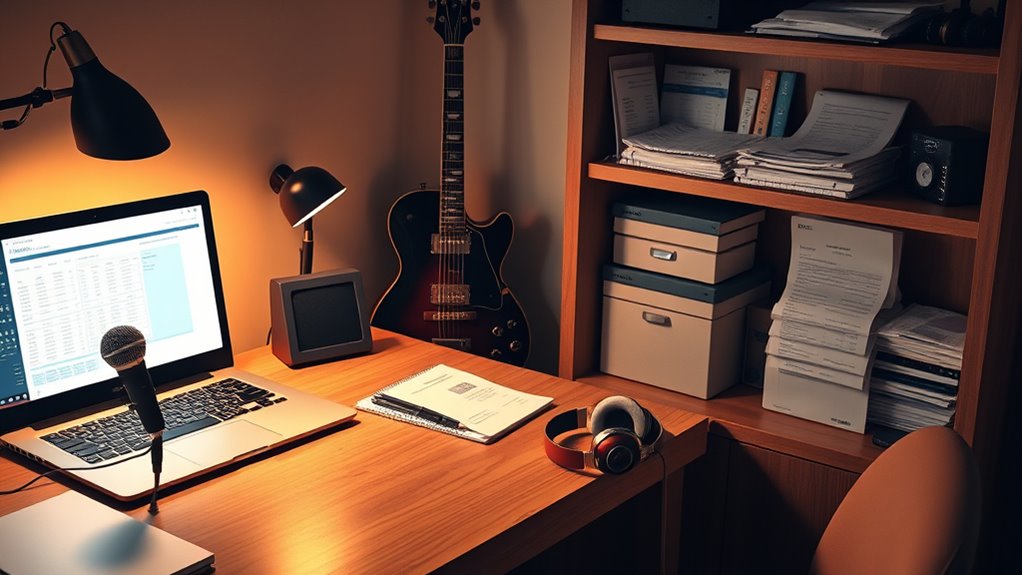
When claiming deductions for personal items and home office expenses related to your music business, it’s important to understand what qualifies and how to properly document these costs. Personal items like musical instruments, equipment, or office supplies may be deductible if used exclusively for your business. Proper documentation is key—keep receipts, logs, and records of usage. To visualize, consider these:
- Your vintage guitar used solely for recording sessions
- A dedicated desk and chair in your home office
- Microphones and headphones purchased specifically for gigs
- Software subscriptions used for music production and management
Meticulous record keeping is essential for substantiating your deductions and ensuring compliance with tax regulations. Additionally, understanding business use guidelines can help maximize your eligible deductions and avoid potential audits.
Non-Deductible Personal Expenses
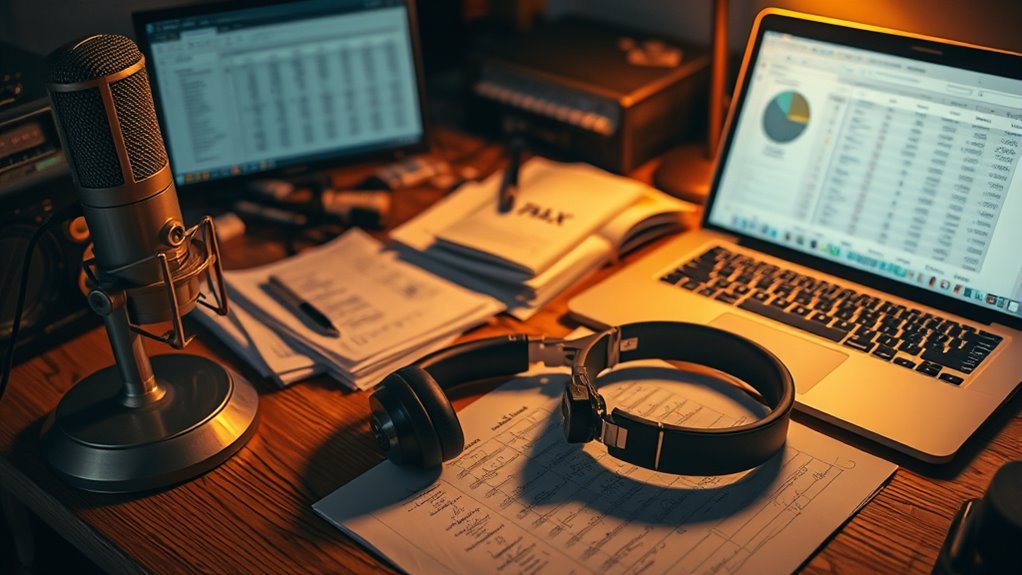
While some expenses related to your music activities are deductible, not all personal costs qualify. Personal expenses that aren’t directly connected to your music work cannot be written off. For example, everyday living costs like groceries, rent, or personal travel aren’t deductible, even if you’re a musician. Similarly, expenses for hobbies or leisure activities unrelated to your profession don’t qualify as business deductions. Personal clothing, unless it’s specifically required for a performance and not suitable for everyday wear, isn’t deductible either. It’s important to keep clear boundaries between personal and business expenses. Trying to claim non-deductible costs can lead to trouble with the IRS, so always focus on expenses that are directly linked to your music business. Additionally, understanding industry transformations such as AI automation can help you identify which new tools or services might be deductible if they directly support your music career.
Recordkeeping Tips for Musicians
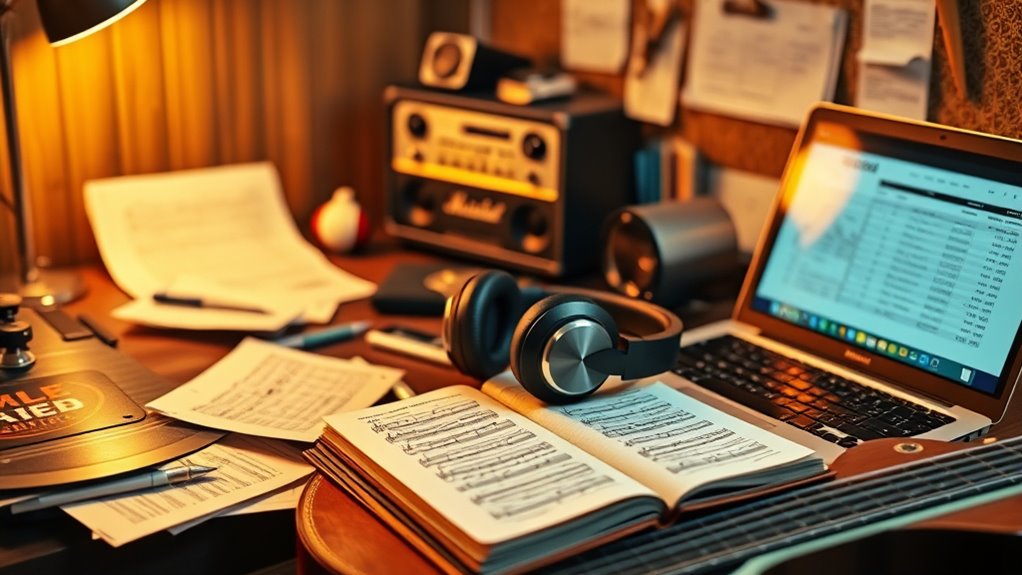
Effective recordkeeping is essential for musicians to maximize their tax deductions and stay organized. Keeping clear, detailed records guarantees you can substantiate your expenses and avoid issues if audited. To stay on top of your finances, consider these tips:
Good recordkeeping ensures musicians maximize deductions and stay organized.
- Keep all receipts and invoices in a dedicated folder or digital folder for easy access.
- Use accounting software or spreadsheets to track income and expenses regularly.
- Separate your personal and business finances with dedicated bank accounts and credit cards.
- Record details like date, amount, and purpose for every purchase or income source.
This approach helps you quickly compile your tax documents, claim the right deductions, and maintain confidence in your financial records throughout the year.
Frequently Asked Questions
Can I Deduct Subscription Fees for Music Streaming Services?
You might wonder if you can deduct subscription fees for music streaming services. Generally, these expenses aren’t deductible unless you use the service directly for your business, such as a DJ or music producer. If you use the service solely for personal enjoyment, it’s not deductible. Keep detailed records and consult a tax professional to determine if your usage qualifies as a deductible business expense.
Are Concert Tickets Deductible if I Attend as a Performer?
Imagine you’re on stage, performing at a concert. If you attend as a performer, the ticket costs generally aren’t deductible because they’re considered personal expenses. However, if you’re attending to improve your skills or network for your music career, some expenses might qualify as business deductions. Keep detailed records and consult a tax professional to determine if your specific situation allows the deduction.
How Do I Separate Personal and Business Expenses for Tax Purposes?
You need to clearly distinguish personal from business expenses to stay compliant. Keep separate records, like receipts and bank statements, for each. Use dedicated accounts or credit cards for your music-related expenses. When filing taxes, categorize costs accurately—such as studio time, equipment, or travel—so you can deduct what’s legitimate. Regularly review your records to verify personal expenses aren’t mixed with business ones, avoiding potential audit issues.
Can I Deduct Costs for Online Music Courses or Tutorials?
You can deduct costs for online music courses or tutorials if they directly relate to your business as a musician or music educator. Keep detailed records and receipts, ensuring the expenses are necessary for your craft. Personal learning that’s not tied to your profession isn’t deductible. Focus on expenses that improve your skills or help you generate income, and consult a tax professional to confirm you’re following current rules.
What Records Should I Keep to Prove My Deductions?
Think of your records as your financial diary—like a hero’s journal detailing every adventure. To prove your deductions, keep receipts, invoices, and bank statements for all music-related expenses. Save proof of online courses, tutorials, and equipment purchases. Maintain organized files, both digital and physical, and note the date, amount, and purpose. This way, when audit time comes, you’re ready to show your journey and justify your deductions confidently.
Conclusion
Now that you know what music-related expenses you can and can’t write off, the real question is—are you tracking everything correctly? Missing a deduction could cost you big come tax time. Stay sharp, keep detailed records, and don’t leave anything to chance. The next step could make all the difference in maximizing your savings—are you ready to take control of your music business’s financial future? The answers might surprise you.
